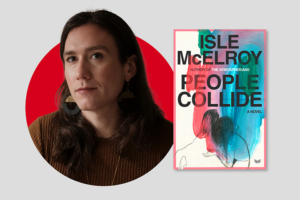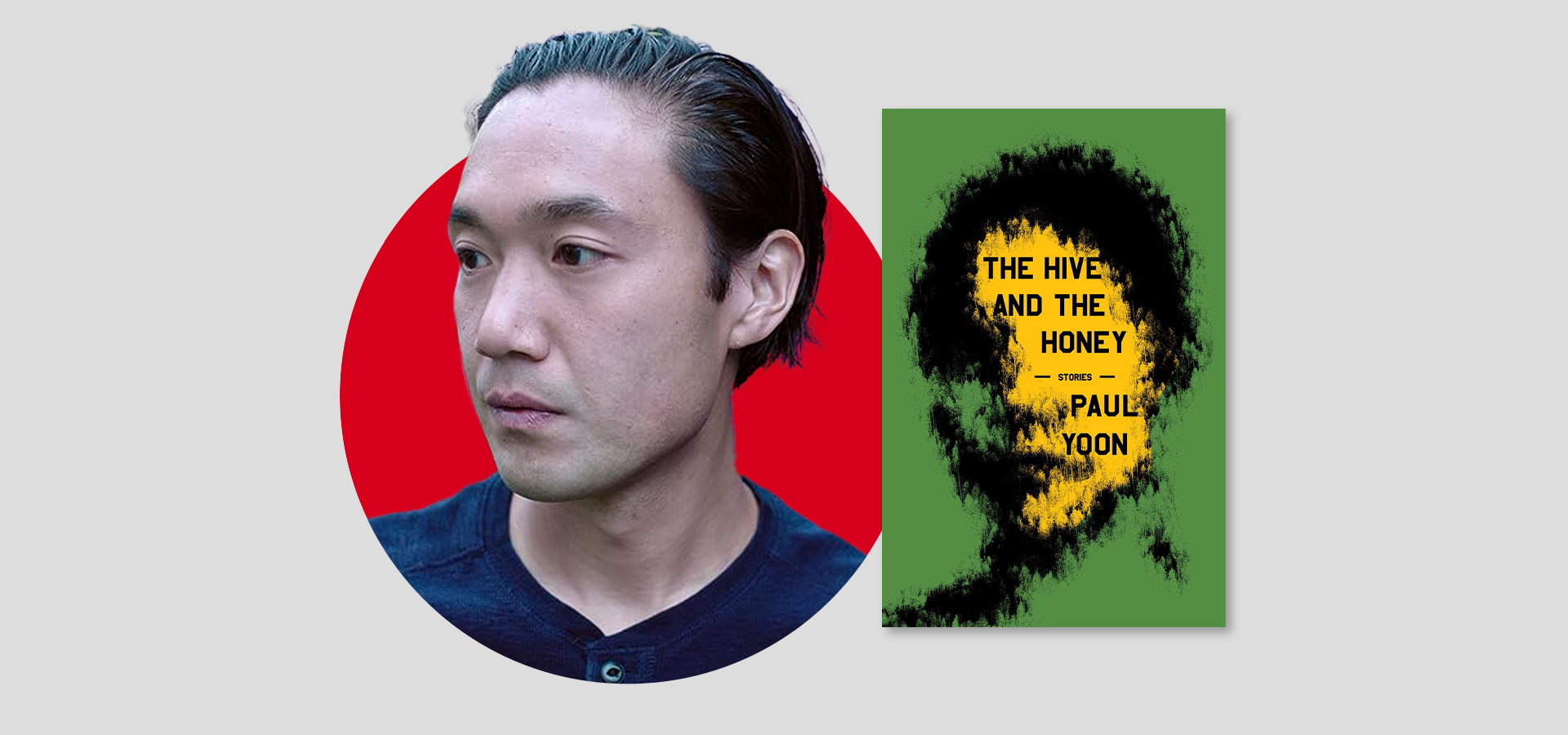
Paul Yoon | The PEN Ten Interview
October 12, 2023
Expansive, haunting and intimate, Paul Yoon’s new short story collection The Hive and the Honey (Marysue Rucci Books, 2023) shows Yoon at the height of his powers. Following characters of the Korean diaspora throughout history and across geographies, the collection’s stories ask essential questions about how we build families and homes.
In conversation with World Voices Festival Associate Director, Sabir Sultan for this week’s PEN Ten, Paul Yoon discusses his love for short stories, his creative goals in writing The Hive and the Honey, and provides insights into how he shaped his new collection. (Barnes & Noble, Bookshop)
1. The Hive and the Honey is your fifth book and your third short story collection. Did you set out to accomplish something different in this collection than you accomplished in your prior collections? How do you see this collection in conversation with your other works?
I wanted the focus of Once the Shore and the breadth of The Mountain in one book: and that became Hive. It’s a book that focuses on aspects of my family history and how I never met so many members of my family because everyone was scattered and separated. But I also wanted to write a book, like The Mountain, that carried the world in some way, geographically—to have the book be vast, a book that traverses far.
2. Stories from this collection were published in BOMB, The Atlantic, and The New Yorker, with the first story published in 2019. When did you know this was a collection?
I knew I was working on a collection from the first story I wrote, which was I think the one you’re referring to, “Bosun,” which was published by the kind, brilliant folks at BOMB. The tricky thing is I never know which stories will make it into a collection. So I wrote “Bosun” with a larger canvas in mind, one I was hoping to create, but I didn’t know if “Bosun” was going to ultimately be a part of it. Happily, it is!
“How lovely and strange then to know that I have come back to the area where I grew up, and I couldn’t be happier and more at home. I had to go to very far places to realize what I was looking for was much closer than I thought.”
3. The seven stories in The Hive and the Honey feature Korean diaspora in locales ranging from South Korea to Japan to Russia, and are set throughout history ranging from 1608 to the 1990s. The stories follow Korean migrants and people living in Korea, from the North and the South of Korea. In the face of these permeable boundaries, different historical settings, and various geographies – is there a unifying Korean identity in this collection? What are the bonds that hold these Korean characters, separated by time and country, together?
I can’t speak to a unifying Korean identity, but I think, growing up, because I had very little access to an extended family, I was often searching for my own version of that. And I think all my characters are searching for their own version of family. They’re quite literally and figuratively orphans. And they want to rebuild. They want to find a home in all sense of that word.
4. The characters in your stories are often traveling, but the act of traveling is enmeshed with a search for connection; in “Komarov” a woman goes to Barcelona to meet the man that North Korean spies tell her is her lost son; in “Person of Korea” a boy goes to an island to find his father; in “Cromer” a husband and wife visit the sea where the husband hopes to come across a young boy who stumbled into their store. What do you see as the relationship between traveling and the search for connection in your work?
I think I travel to find a connection. I always have. A connection to the greater world. But also, I think a connection that feels more intimate, more personal. I grew up, for the most part, never feeling truly at home. And I think I traveled to find that feeling. If I wasn’t feeling it where I was growing up, maybe I’d find it elsewhere, worlds away. How lovely and strange then to know that I have come back to the area where I grew up, and I couldn’t be happier and more at home. I had to go to very far places to realize what I was looking for was much closer than I thought.
“I love the art of fiction because, when it is amazing, it can offer us a translation of life that is both real and not real. And through that duality maybe we can learn something deeper and truer about ourselves and the world we are writing about.“
5. In the book’s acknowledgements you mention several works you read as research. When writing a story influenced by research, how important is fidelity to historical fact to you?
I took great liberties—and I should say all gross inaccuracies are my own and not the fault of the brilliant and passionate and tireless scholars and writers whose work I was so inspired by. I think the best way to answer this is that I love the art of fiction because, when it is amazing, it can offer us a translation of life that is both real and not real. And through that duality maybe we can learn something deeper and truer about ourselves and the world we are writing about.
6. Is there a story in the collection you’re most fond of? If so, why?
“At the Post Station” because it feels the farthest away from my life. And because I was the most daunted by it.
7. How did you approach ordering the stories in the collection?
My hope is that each story communicates with the one beside it, in setting, in movement, in what it focuses on—for example, the ending of “Bosun,” the first story, focuses on boxing, so it made sense to move to an actual boxing story after that. If the movement of those “chapters,” so to speak, are firmed up and overlap, my hope is that we find a bigger thread moving through the whole book, where the accumulation of the stories, and their order—as we travel the world—become one narrative.
8. Do you prefer writing novels or short stories? How does your approach to each type of project differ?
I will always have a deep love for the short story form—it was my first love. Short stories were what I wrote when I was first starting, and short stories were what I read and read and read and fell head over heels in love with—the thing that made me want to be a writer. The funny thing is I’m not convinced I ever wanted to write novels. It’s just that the two I wrote turned into longer projects because the canvas felt bigger, and I wanted to live in those worlds for a little while longer. Which is to say: I think my approach is always thinking that I’m writing a short story.
“My hope is that we find a bigger thread moving through the whole book, where the accumulation of the stories, and their order—as we travel the world—become one narrative.“
9. What are some of your favorite short story collections?
Too many to name, but I will always love Alice Munro’s Open Secrets, David Means’s new one, Two Nurses, Smoking, Jamil Ahmad’s The Wandering Falcon, Andrei Platonov’s Soul, Colin Barrett’s Homesickness, Chris Power’s Mothers, Daniyal Mueenuddin’s In Other Rooms, Other Wonders, and everything by Alistair Macleod, Deborah Eisenberg, Joy Williams, and William Trevor.
10. Writing is often a private and intimate process. On October 10, The Hive and the Honey will also belong to readers. How do you prepare for that?
A lot of running. All kidding aside, all I ever wanted was to be a fiction writer, and I think I’ve gotten to the point where I’m so grateful that people know of my work and are into it. This is my fifth book, as you mentioned, and I’ve been practicing this art form for over two decades now, and I can’t believe I’ve gotten the chance to be an artist for this long. I literally cannot believe it. It feels like a miracle.
Paul Yoon is the author of four previous works of fiction: Once the Shore, which was a New York Times Notable Book; Snow Hunters, which won the Young Lions Fiction Award; The Mountain, which was an NPR Best Book of the Year; and Run Me to Earth, which was one of TIME magazine’s Must-Read Books of 2020 and longlisted for the Andrew Carnegie Medal for Excellence in Fiction. A recipient of a Guggenheim Fellowship, he lives in the Hudson Valley, New York.
The PEN Ten Interview Series
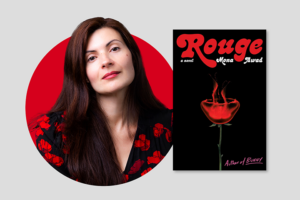
Mona Awad | The PEN Ten Interview
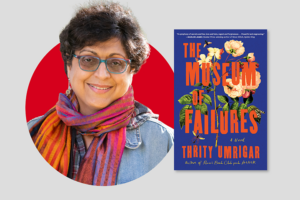
Thrity Umrigar | The PEN Ten Interview
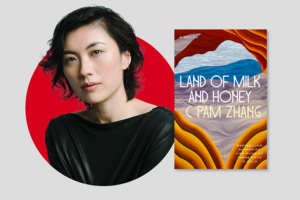
C Pam Zhang | The PEN Ten Interview
